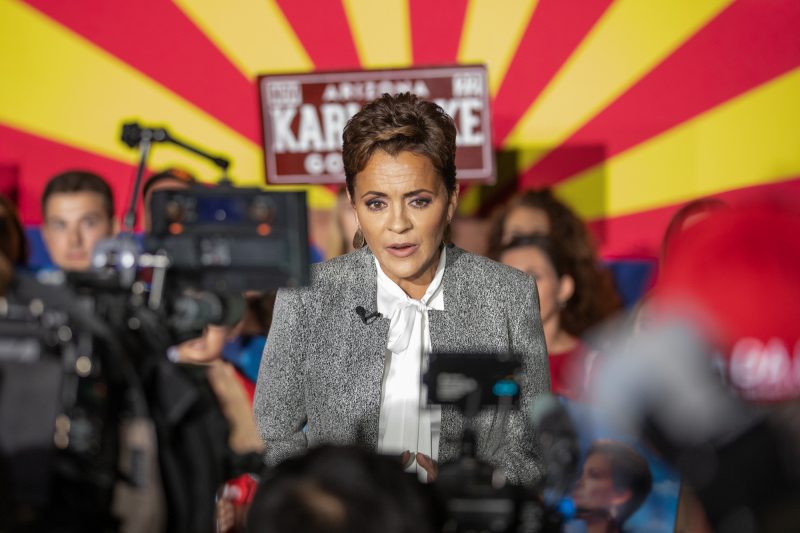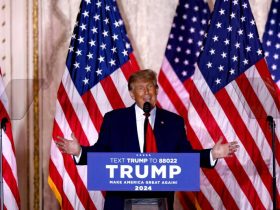PHOENIX — After Kari Lake rode former president Donald Trump’s endorsement to the Republican nomination for governor of Arizona, some of her aides and allies urged her to moderate her campaign to compete in the November election.
Advisers wanted her to focus less on Trump’s false claims of voter fraud and more on homelessness, water independence and border security, according to people familiar with their counsel. Business leaders recommended that she tone down her MAGA message to create a friendlier climate for capital. Republican strategists asked her to stop denigrating early ballots, a method of voting once critical to Republican victories in the state.
In an August meeting at the state party’s headquarters, GOP operatives delivered a warning, which was recalled by two attendees: Campaigns that failed to mobilize supporters to vote early would be at a disadvantage. After pushback from some members of Lake’s team, the candidate herself spoke up. She said that True The Vote, the Texas-based group pushing unfounded claims of voter fraud, had told her to instruct supporters to mail in their ballots — not put them in drop boxes — as a way to “confuse the Democrats.”
The eyebrow-raising comment made clear to those present that Lake, 53, was a true believer, cocooned in a pro-Trump echo chamber.
“She would never break frame,” said a fellow Republican who spoke with Lake about her refusal to acknowledge Trump’s defeat. “She’d sort of look at you with a puzzled face and be like, ‘But the election was stolen in 2020.’”
The person was among 32 outside allies, senior advisers and business leaders interviewed for this report. Many spoke on the condition of anonymity to describe private conversations or avoid professional reprisal.
Lake burst onto the national political stage this year as perhaps the purest embodiment of Trump’s grievance-fueled brand of politics. Her slash-and-burn campaign operation courted controversy, stoked distrust in the democratic process and earned her mentions as Trump’s possible 2024 vice-presidential pick — or perhaps even a presidential candidate herself.
Then she lost.
Now, her failed campaign offers a case study in how Trump has warped the GOP’s electoral prospects. The positions adopted by candidates to win his endorsement — often necessary to get through the gantlet of GOP primaries — appear untenable in the battleground states that Republicans would need to win to reclaim the White House.
Foremost among those positions is refusal to accept the outcome of elections, which Lake made a rallying cry. As she transformed herself from a local television news anchor into a standard-bearer for Trump’s political movement, her campaign became a test of the power, and limits, of his politics.
Lake declined to be interviewed for this story.
Interviews, internal documents and voting data point to the reasons behind her defeat: The candidate, so focused on parroting Trump and settling personal scores, failed to execute on a plan to court the independents and centrist Republicans who decide elections in Arizona, once a red state that now gleams purple.
As advisers urged her to consolidate GOP support after the primary, Lake remained fixated on a grudge match against people loyal to the legacy of the late Sen. John McCain. In the race’s closing days, she appeared in the suburbs alongside Stephen K. Bannon, the far-right radio host and former Trump strategist who was sentenced in October to four months in prison for contempt of Congress.
A meaningful share of Republican voters showed up to the polls but spurned Lake. Statewide, she received nearly 120,000 fewer votes than did the victorious Republican candidate for state treasurer, Kimberly Yee, who stressed financial literacy and fiscal discipline on the campaign trail instead of conspiracy theories about the 2020 election. Nine percent of self-described Republicans went so far as to vote for Democratic nominee Katie Hobbs, according to exit polling. Independents broke for Hobbs by seven percentage points.
While early signs of Lake’s undoing now blink brightly, the race was close. She lost to Hobbs by just 17,000 votes — less than a percentage point. And she ran ahead of Blake Masters, the GOP nominee for Senate.
“There’s all this hand-wringing, but with a margin that close, there were a bunch of ways to close the gap,” said Sam Stone, Lake’s policy director. The biggest barrier, Stone said, is that the “majority of Arizonans don’t want to vote for Trump or Trump-affiliated candidates.”
A Trump spokesman did not respond to a request for comment.
The circumstances of Lake’s loss share some features with disappointing GOP results elsewhere. Other aspects are unique to her unconventional first-time candidacy, which gained her celebrity status nationally but failed to win enough votes back home in Arizona.
Her loss is unique in another way. She has refused to accept it.
Rather than concede, as other major election deniers who lost in 2022 have done, she has pointed to problems with printers in Maricopa County, home to Phoenix, that caused many voters to wait in line, travel to another polling place or deposit their ballots in secure drawers for tabulation at the county’s main site downtown. An Arizona judge found that the mechanical problems did not prevent anyone from voting.
Lake last week filed a lawsuit seeking an order allowing her to inspect 1.5 million ballots in Maricopa County and declaring her the winner of the election, among other demands. She issued a statement attacking the county, vowing, “I will continue to fight for the appropriate remedy to the mass voter disenfranchisement that clearly affected the outcome of this election.”
Trump’s antipathy for losers is widely known. But he has welcomed Lake twice to his Mar-a-Lago Club in Florida since her defeat in Arizona. On social media, he has spread falsehoods about Arizona’s elections and called for her to be “installed” as governor. The effect has been to nationalize her loss — an emblem of the hard fall that could await all candidates running proxy Trump campaigns in states he lost.
“It was both a collapse and, now in hindsight, it was a failed campaign from the beginning,” said a high-ranking Arizona Republican. “I don’t really know what to say beyond outrageous arrogance and never getting out of primary mode. This election wasn’t stolen. It was given away.”
Lake left her job as a local Fox anchor in March 2021, saying in a direct-to-camera video that she had grown disillusioned with the media. “I began to feel that I was contributing to the fear and division in this country by continuing on in this profession,” she said.
Two months later, she came across a young operative, Colton Duncan, who would become critical to her nascent political career. The pair met at a dinner in D.C. hosted by the head of the Log Cabin Republicans, the conservative gay and lesbian political organization, according to two people with knowledge of the event. Duncan was working at a firm called Arsenal, which made its name in viral video productions, and had previously worked at the pro-Trump youth group Turning Point USA.
In June, Arsenal signed her as a client. Its leaders took on prominent roles advising her fledgling campaign.
People who interacted with Lake said they were impressed by her charisma and communication skills, which allowed her to display a mastery of complex topics. More personally, she displayed an uncommon degree of empathy toward staff, aides said, cultivating loyalty in return. One young aide on occasion ended calls with her by saying, “I love you.”
Lake spent the summer seeking to win the favor of Trump and his associates.
In August she headed for South Dakota, where Mike Lindell, the MyPillow CEO, was holding a “Cyber Symposium” to air debunked claims about fraud in the 2020 election. She appeared on Bannon’s “War Room” show from the symposium — part of a strategy to win over the party’s right flank, as an adviser recalled, and bolster her pro-Trump bona fides.
It worked. Trump endorsed her the following month, rewarding her for her unrelenting focus on his false claims of voter fraud and saying she would “fight to restore Election Integrity (both past and future!).”
That fall, Lake had her first fundraiser at Trump’s Florida retreat. Her campaign would ultimately spend more than $100,000 at Mar-a-Lago, state filings show.
Lake and Trump spoke regularly in the ensuing months, according to advisers. The pair discussed speculation that she could be his vice-presidential pick when he praised how she responded to a question about the topic, telling reporters she would be their “worst freaking nightmare for eight years” in the governor’s office, according to a person familiar with the conversation. During the campaign, she kept Trump informed about polling and upcoming rallies, a former adviser said.
She built her national profile by sparring with a growing group of media outlets that flocked to those rallies. A former adviser estimated she had notched more than $300 million worth of free media coverage over the course of the primary, compared to about $50 million for her main opponent, Karrin Taylor Robson, a conservative who rejected the false claims that the 2020 election was stolen.
Against the advice of at least one adviser, Lake took aim at Robson’s husband, a developer and business leader with a vast financial and political network.
She also ignored at least two aides who urged her during a meeting in May not to oppose mail-in ballots. Stone, her campaign’s policy director, said Republicans paid the price for neglecting the mail-ballot operation once integral to the political machine managed by McCain.
“This has been missing for several cycles now,” Stone said. “And we’re getting our butts handed to us.”
Another adviser said Lake’s approach was guided not by data but by her instincts and her past as a newscaster. “She wanted to be a television person at heart,” the adviser said. “She wanted to sensationalize everything.”
That approach landed her in the middle of the country’s most volatile culture wars. In June, a tweet from her account vilified drag queens — part of a sustained GOP effort to paint gender nonconformity as menacing to children. But the post ran counter to Lake’s own history of attending drag shows and hosting one at her home, as a performer and former friend of hers publicly recounted.
Lake convened staff on a call, according to a person who participated, and helped craft a plan “to dig in,” as the person said, contesting the performer’s claims and threatening to sue him. No suit was ever filed.
Lake’s bare-knuckled approach to political controversy drew comparisons to Trump while also eliciting speculation among Arizona Republicans that she could be his running mate in 2024.
Democratic operatives also took notice, with David Plouffe, who managed Barack Obama’s 2008 campaign, telling Axios that Lake looked like a “plausible presidential candidate.”
The day after the Aug. 2 primary, Lake’s sleep-deprived staff gathered in a campaign conference room.
Advisers told her that voters already knew she was endorsed by Trump and urged her to begin tailoring her message to the general election, which was three months away. To win in November, they said, she would have to broaden her appeal.
“The idea we tried to get across was, ‘We don’t need to spend another penny calling you the Trump candidate,’” one person who participated in the discussions recalled.
Business leaders who met with Lake periodically also urged her to “reduce the intensity of the so-called MAGA message,” one participant described. “She took it for a while.”
But Lake tired of that strategy, which aides said she felt wasn’t “genuine” or “scorched earth enough.” She sidelined her general consultant and elevated Caroline Wren, a veteran GOP fundraiser with close ties to Trump who was listed as a “VIP Advisor” on the permit for the rally at the White House Ellipse that preceded the Capitol attack on Jan. 6, 2021.
Wren brought extensive fundraising networks to the campaign and helped channel the energy of young staffers and volunteers who flocked to Lake because of her charisma and national profile. But some on the campaign said Wren indulged the candidate’s combative impulses while irking other staffers, on at least one occasion prompting a complaint about disrespectful workplace conduct.
Wren declined to address a question about the episode.
One adviser said the influx of former Trump aides in the campaign’s final weeks sent the wrong message. “They saw the race as their ticket to a vice-presidential candidate,” the adviser said.
Lake was her own decision-maker, aides said, and her decision was never to put distance between herself and Trump. One campaign ally proposed that Lake tell Trump to travel to Arizona no later than early September, allowing her to differentiate herself from the divisive former president before early voting began in October.
On Oct. 9, however, Trump came to town. Lake vacuumed a red carpet for him in an image blasted out by her allies as an example of “servant leadership.” Critics saw it as flagrant bootlicking.
Rather than honing her message to Arizona voters, Lake lent her name to gubernatorial candidates out of state, endorsing Tudor Dixon in Michigan and Doug Mastriano in Pennsylvania — both of whom also ended up losing their races. Govs. Ron DeSantis of Florida and Glenn Youngkin of Virginia, meanwhile, both traveled to Arizona to stump for her. But she was never endorsed by her primary opponents and she never appeared with Doug Ducey, the sitting Republican governor.
So confident was Lake that her operation was on the right track that she redirected donors to Masters in the campaign’s final weeks.
Behind the scenes in the early fall, a small group of campaign staff, supporters and business allies gathered to begin preparing for a transition to governing the state. Participants met every Friday and wrote regular reports for the campaign.
The plans envisioned a “Victory Tour” across Arizona. Transition documents show that aides and supporters already had names for key roles, from chief lobbyist to border czar. The team used a color-coded scoring system to evaluate state agencies they anticipated would soon fall under their control.
After scorning McCain’s memory in virtually every other respect, Arizona’s GOP slate held to an election-eve tradition he followed. They gathered at the steps of a courthouse north of Phoenix where Barry Goldwater launched his presidential bid in 1964 — and where McCain took to rallying supporters before asking for their votes.
This year, Bannon closed down the rally.
“This is not a campaign, it’s a movement,” Bannon said, one that would “end here tomorrow, with the election of Kari Lake as governor!”
When printer problems emerged in Maricopa County on Election Day, Wren and Lake piled into a car, driven by Lake’s husband, to visit polling places affected by the errant printers.
They called Masters, who was also touring sites. Together, they stood behind a 75-foot line at a voting location, using a bullhorn to urge people not to leave.
That night, the first release of preliminary results looked grim for Republicans. But another drop, shortly after midnight, looked more favorable, and cheers erupted in the GOP’s “war room” in a Scottsdale resort, according to someone who was there.
In the ensuing days, as it became clear the results were not breaking for Lake, views varied about how to respond. Some people in the war room remained confident. Ric Grenell, Trump’s former ambassador to Germany and acting intelligence director, “thought it was done and won,” one person said.
But the campaign’s own data showed that defeat was possible, even likely, despite favorable polls.
“I think we were aware of everything that could go wrong — it just all went wrong,” said someone who viewed internal modeling, which showed Lake underperforming Trump’s 2020 results in key areas, such as Pima County, home to Tucson, which was outside her reach as a Phoenix-based news anchor.
“You can’t fix things when you don’t have the resources to do it or the interest to move to the middle on key issues,” this person said.
Lake’s advisers told her four days after the election, on Saturday, Nov. 12, that she had lost, according to Don Huffines, a businessman and former Texas state senator who had helped raise money for her and had been tapped to be chief of staff in a Lake administration.
“It was very memorable,” Huffines said, describing a scene in which aides and allies huddled in the war room as votes were still being tabulated and released. Lake joined from her home. “She kind of started crying on the phone a little bit. It was a very emotional time right then. And she wasn’t emotional for herself. It wasn’t for show. She was upset for the people of Arizona.”
Those participating in the discussion, Huffines said, included Bannon and Floyd Brown, the longtime conservative operative and founder of the Western Journal website, whose recent headlines label Biden a “fool” and decry “woke pandering.”
Huffines said Bannon was measured, in contrast to his public declarations. He advised her to use the campaign’s resources to pursue litigation that would uncover any potential fraud. Lake at one point expressed concern that she would have to cover those costs personally, Huffines said.
Some of Lake’s allies wanted Masters to wait to concede, but he bowed out several days following his projected loss. Mark Finchem, the failed Republican candidate for secretary of state, has not conceded and has joined Lake in circulating unproven claims that the election was stolen. The race for attorney general is going to a recount, with Republican Abe Hamadeh trailing by 511 votes.
People familiar with the post-election discussions say it has mostly fallen to Wren to reconcile Lake to her loss, even as the former candidate promotes her lawsuit and shares posts calling for a revote.
One person said the decision not to go “full ‘Stop the Steal’” — a reference to the rallying cry that brought protesters to D.C. on Jan. 6 — is shaped by the experience of the Capitol attack, which led to a raft of investigations, some of them involving people on the Lake campaign. Lake has not called for protests, even as she promises to keep “fighting.”
In the meantime, she has been weighing what to do next, according to those in touch with her. She has been approached about media jobs, these people said, but is inclined to go in a different direction, possibly acting as a surrogate for Trump’s 2024 campaign.
“Listen, I don’t know what the future holds,” she said in remarks at Mar-a-Lago this month, according to an audio recording obtained by The Washington Post, “but I know I got a lot of fight left in me.”
Lenny Bronner, Ruby Cramer and Emily Guskin contributed to this report.








